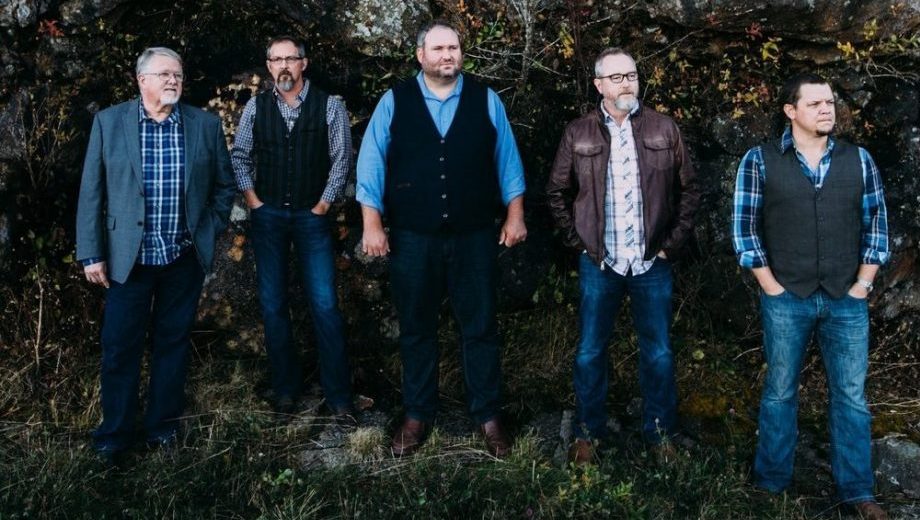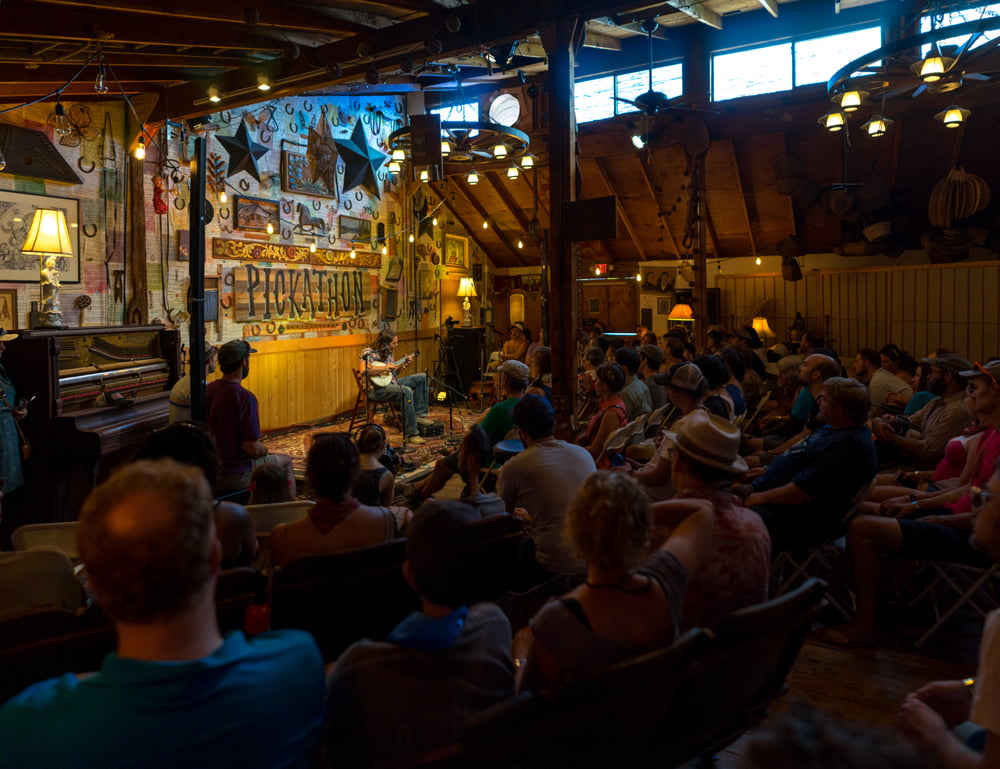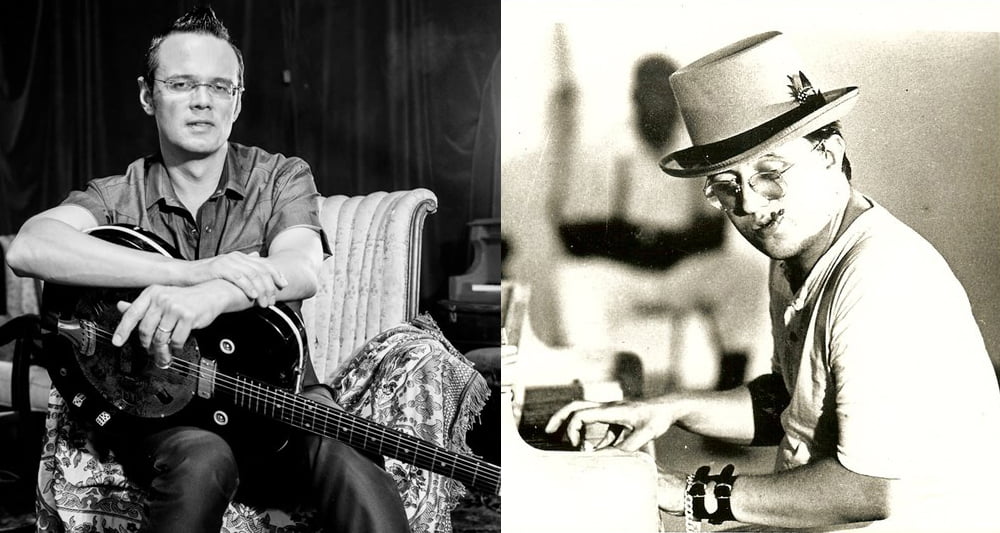For nearly 15 years, Balsam Range have distinguished themselves in the bluegrass community as powerful performers and musicians, even winning an IBMA Award for Entertainer of the Year in 2018. While it is notable for a bluegrass band to have maintained its original members for so long, it is perhaps more remarkable that its five members all grew up within the same region of Western North Carolina.
With a diverse array of influences held together by the common thread of their geography and formative musical years, Buddy Melton (fiddle), Darren Nicholson (mandolin), Dr. Marc Pruett (banjo), Caleb Smith (guitar) and Tim Surrett (bass, dobro) create music that is rooted in the traditions of their youth but not confined to typical genre norms. Their newest album, Moxie and Mettle, explores themes of uncertainty and a sense of powerlessness that will likely resonate with listeners’ own experiences during the pandemic. Similarly, the theme of trying to feel content with one’s life can be felt on tracks such as “Richest Man,” named the 2021 IBMA Song of the Year.
The Bluegrass Situation spoke with Buddy Melton and Tim Surrett over Zoom.
BGS: What was the timeline of making this record around the pandemic? Was it something you were working on and then had to slow down, or were you working on while things were shut down?
Melton: We were in that stage where we needed to move forward with a new project, but we had been so busy it was getting difficult to find time to work up new material and get in the studio. We took advantage of the shutdown. It gave us something to focus on and keep the positive efforts and creative side of us together. We’d worked up a lot of the songs prior to that, but that time off allowed us to get busy and find the remaining songs and round out a good record.
I’ve heard lots of artists say the same thing. The shutdown gave them more time than usual to listen to and refine the recordings they made during it.
Surrett: Yeah, we just did it a little bit at a time. We’d get together and work up two or three songs and go record them. Then a couple of months later, we’d do the same thing again. It’s always a fun process for us to get together and just listen to songs and then tear into them.
Melton: Sometimes we work better with a deadline. So, it was bad for us to have that time in a way, because we didn’t push it too hard. It was fun and relaxing. I will say it was a different dynamic, not feeling rushed, and we just decided when we’ve got enough completed, we’ll worry about the record, but let’s use this as an opportunity to stay together and be creative as we can together.
What’s important to you when you’re picking songs? Is there something that speaks to you? Are there themes that you usually gravitate towards when choosing material?
Surrett: Well, for years, we kept getting the train songs. We had some good ones like “Trains I Missed” and what not. But no, I don’t think we look for a certain theme. The first thing I look for is if something is interesting musically. And then a song that tells the story is a great thing. And we’re blessed with songwriters like Milan Miller and Adam Wright who can write a little three-minute movie in a song, and it’s got interesting chords, or something that we feel like we can arrange. That gets us fired up.
Melton: I don’t know why it is, but by the time the albums are over with, for some reason, they sometimes have a common theme. I don’t know if subconsciously we are connecting with that message. And this particular one, Moxie and Mettle, has a lot of “traveling through life” sort of vibes about the songs with “Richest Man,” and “Grit and Grace,” and “Rivers, Rains and Runaway Trains,” and “Traveling Blues.” I don’t know if we’re missing that element in our lives and that’s why migrated to that. We also like to incorporate original artwork if we can. All of our album covers have been paintings for the most part. As we got to the end of it and start looking at the graphics and start talking about the pictures, we ended up using this Adam Wright painting of an old car sitting at an intersection. You’re wondering which way is it going to go but it’s just traveling, trying to get through life, and it seemed to fit the vibe of this record to me.
I was wondering about that, because after I listened to the record a couple of times, I had my own interpretation of the theme, and I was wondering if you went in with a theme, or came out on the back end with one.
Melton: We didn’t intend to have anything. But again, I think a lot of those songs have some similar storylines and meanings to them.
There are a lot of references to taking stock of life and trying to figure out what’s important, which everybody had to do, even if they weren’t consciously thinking about that kind of thing.
Melton: You could probably pull that out of just about every song on that record. It’s about being content with where you are in life, etc. So, they all have some similar thoughts, I think.
I know you guys are very involved in the Western North Carolina music scene. Could you tell me a little bit about the work you guys do in that community?
Surrett: We all grew up in this area. Haywood County is where we all live now but Buddy and Darren are from Jackson County. Music was so much a part of life growing up here in the mountains. Square dancing, clogging, mountain dancing, and old-time music were a huge thing, and you get indoctrinated with it. And there are so many great musicians that still come out of this region. We joke with people all the time that we’re not even sure we’re the best band in Haywood County. There are so many great players that come from this region, and you cannot help being exposed to it, especially growing up when most of us did. It was an enormous part of life here in the mountains. And it’s fun to see that go on as some of us have become elder statesmen of that scene now.
You seem like you are stewards of music in that region, and you run a festival, don’t you?
Melton: Yeah, The Art of Music Festival. It’s coming up in the first week of December. We took that on as a project for our area. We chose the lowest-occupancy weekend of the entire year to see if we could stimulate the economy in our county, just to try to help out. Most people will pick early fall or spring to have an event, so we chose a terrible weekend to try to put on a bluegrass festival. And it’s a really great thing. A lot of work and effort went into it, but it’s not just a bluegrass festival. Our primary desire was to bring some of our favorite artists and music to Haywood County to help to expose the local folks to music they wouldn’t necessarily hear otherwise. We have an orchestra that comes in, we bring some of our favorite studio musicians, we have full-scale bands with piano, drum, steel guitars, the whole bit, but then we’ll have bluegrass bands like Blue Highway and The Cleverlys. It’s been fun to create something. The opportunity to have a music festival that is open to anything we want to do with it. I think that’s important. It helps our music grow and it exposes people to our music that come for other reasons.
You draw from a wide range of influences and bring it into your sound. Is that something you actively try to do, or does it come naturally because you all listen to a lot of different music?
Surrett: All of us come from different musical backgrounds. Darren loves country music. Caleb and myself both come from a gospel music background with a giant love for jazz music. And for me, personally, I like the rock ‘n’ roll that I grew up on. So we’ve got a Beatles tune, we’ve got Allman Brothers. Marc, of course, thinks there’s two kinds of music: Flatt & Scruggs music and not Flatt & Scruggs music. Buddy’s got the gift of finding great songs and listening to songwriters. That’s where the majority of our songs come from. But nothing has ever really been off-limits. Everybody’s got a voice and if they bring it in we’ll give it a whirl. By the time we play it and sing it, it’s going to sound like us. We’ll give anything a try. But we haven’t tried Pink Floyd or anything like that yet.
Sounds like that’s what’s next.
Surrett: It’s not off the table.
Melton: We all grew up around this area where we were influenced by this common thread of Southern Appalachian culture and music. We all understand those timings and those concepts. We’ve all been around it our whole life. So, you go away and you learn different things, and when you come back, that history is the glue that puts it all together. Just like all our accents are the same. We don’t have family harmony. We got country harmony. That’s part of it. We don’t put t’s in “mountains.” It definitely helps to have some similar dialogue and accents and phrasing and stuff like that.
Surrett: It’s a rare thing for, as you well know, a bluegrass band to have five guys from the same ten-mile radius. It’s not a family relations-type thing, as far as we know. But it definitely brings a thread of commonness.
Melton: January will be 15 years, basically. That’s a long time for a bluegrass band of the same five guys to stay around.
Yeah, that’s amazing for a band when you can anticipate other people’s next move.
Surrett: We have several points in our program that are not really scripted. They just kind of organically happen. We know where it’s going, and you can feed off that and let songs change and morph. And it’s a lot of fun like that.
Melton: We’re just grateful to still be together after 15 years and for the many great people we’ve met along the road that we’ve missed seeing over the last year and a half. We’re so happy to see the music scene coming back around. Hopefully, we can all do a part to keep that alive. Like many things when you don’t have it is when you realize you need it. And music is so important to people’s lives. As it’s building back, it almost seems like there’s even more excitement prior to the shutdown. So, we’re just grateful for that and excited to be a part of it.
Photo Credit: David Simchock



